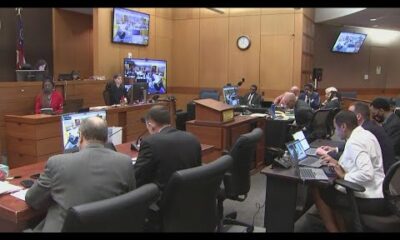Mississippi Today
Two years after Jimmie ‘Jay’ Lee’s disappearance, accused killer goes on trial

More than two years after Jimmie “Jay” Lee disappeared, sparking fear in Oxford’s small LGBTQ+ community, a University of Mississippi graduate will stand trial on capital murder charges this week.
Sheldon Timothy Herrington, Jr., is accused of killing Lee, a fellow Ole Miss graduate who was pursuing a master’s degree in social work, in an effort to keep their casual relationship a secret, according to arguments prosecutors made during Herrington’s preliminary hearing two years ago.
Herrington is charged with capital murder for allegedly kidnapping Lee, then killing him, according to the indictment. If convicted, Herrington faces the death penalty or life in prison without the possibility of parole.
The 24-year-old was indicted by a Lafayette County grand jury last year. He is being represented by state Rep. Kevin Horan. In interviews with Mississippi Today and other media outlets, members of Herrington’s family, who lead a prominent church in Grenada, have vociferously defended his innocence.
Herrington is charged with capital murder for allegedly kidnapping, then killing, Lee. If convicted, he faces the death penalty or life in prison without the possibility of parole.
“We’re all in shock, we’re all devastated, and we are all looking forward to proving his innocence,” Herrington’s half-brother, Tevin Coleman, said two years ago.
Dozens of people from Herrington’s hometown, including the then-superintendent and Grenada County Sheriff, have written letters to the court on his behalf before evidence was presented during 2022’s preliminary hearing.
In Oxford, Lee’s disappearance and death led his friends to organize a local movement, called Justice for Jay Lee, in an effort to remember Lee’s life. They have protested outside the Lafayette County Courthouse so loudly their chants could be heard during proceedings. They have tailgated in the Grove and tabled during local drag shows where Lee performed.
“It doesn’t feel real, especially since they haven’t found his body,” Braylyn Johnson, one of Justice for Jay Lee’s main organizers, told Mississippi Today two years ago. A fellow Ole Miss student, Johnson lived with Lee during the pandemic.
The trial will be presided over by Judge Kelly Luther. It was originally slated for earlier this fall but was postponed due to a lack of hotel availability for jurors during football season.
Anticipating the coverage, Luther ruled earlier this fall that jurors will be brought in from outside the county after denying a joint motion to seal all pre-trial filings in the case.
The jury is being selected in Forrest County, but there is nothing in the case file to indicate from which county jurors were being chosen.
Last week, Luther ordered that any public demonstrations in relation to the case will occur in the park next to City Hall. The potentially lengthy proceedings at the Lafayette County Courthouse are expected to bring significant media attention to the small north Mississippi college town.
Lafayette County District Attorney Ben Creekmore did not respond to a request for comment from Mississippi Today. A special prosecutor has been appointed to assist him.
Herrington has been out on bond since December 2022. Lee was declared legally dead earlier this month, but police have not recovered his body. The public has received little information about Lee’s potential whereabouts, or what efforts police have undertaken to find him.
Lee went missing on July 8, 2022, and Herrington was arrested a few weeks later. During the preliminary hearing, an Oxford Police Department detective testified to a plethora of evidence, including Snapchat and text messages, Google searches and video surveillance.
According to cellphone location data, Lee’s last location was in the vicinity of Herrington’s apartment on July 8.
Earlier that morning, the two exchanged messages about a fight they’d had. Herrington asked Lee to come back to his apartment, and Lee responded that he thought Herrington was “just tryna lure me over there to beat my ass or something.”
At 5:56 a.m., minutes after Lee messaged Herrington he was on his way, Herrington searched “how long does it take to strangle someone gabby petito,” then “does pre workout boost testosterone.”
Less than an hour later, video surveillance shows Herrington buying duct tape at Walmart and, later that day, retrieving a long-handle shovel and wheelbarrow from his parent’s house in Grenada and putting it in the back of a box truck that he used for a moving business.
During the police investigation, DeSoto County Sheriff’s Department “cadaver dogs” — K-9s that are trained to identify the smell of a dead body – “alerted” three times in Herrington’s bedroom, once in his living room and in his car.
During the preliminary hearing, Horan repeatedly questioned if the police had reviewed the dogs’ training or checked if the dogs had ever before correctly identified the smell of a dead body.
Last week, the prosecution agreed to withdraw evidence stemming from “the K-9s searches or purported detection of human remains” after Horan filed a motion to exclude it.
Horan has also filed a motion to dismiss the indictment on technical grounds.
Read Mississippi Today’s previous reporting on the case here.
Justice Reporter Mina Corpuz contributed to this report.
This article first appeared on Mississippi Today and is republished here under a Creative Commons license.![]()
Mississippi Today
On this day in 1967


Dec. 4, 1967

Martin Luther King, Jr. announced creation of the Southern Christian Leadership Conference’s Poor People’s Campaign, a movement to broadly address economic inequalities with nonviolent direct action.
“It must not be just Black people,” argued King, “it must be all poor people. We must include American Indians, Puerto Ricans, Mexicans and even poor whites.”
The idea for the push came from Marian Wright Edelman, who had recently taken U.S. Senator Robert F. Kennedy to witness poverty firsthand in the Mississippi Delta.
When she shared the idea that Washington officials should meet the nation’s most impoverished citizens, King embraced the vision, telling reporters, “We will go there, we will demand to be heard, and we will stay until America responds. If this means forcible repression of our movement, we will confront it, for we have done this before. If this means scorn or ridicule, we embrace it, for that is what America’s poor now receive. If it means jail, we accept it willingly, for the millions of poor already are imprisoned by exploitation and discrimination. … In short, we will be petitioning our government for specific reforms and we intend to build militant, nonviolent actions until that government moves against poverty.”
King talked of a debt that the nation owed Black Americans, who were set free in 1863, “yet they were not given any land to make that freedom meaningful.”
He compared it to an imprisoned man whom authorities learn is innocent, “then going up to the man saying, now you are free. And you don’t give him any bus fare to get to town. You don’t give him any clothes to put on his back. You don’t give him any money to get on his feet in life again. The whole code of jurisprudence would rise up against this and yet, this is what America did to the Black man.”
King didn’t live to see this dream through, assassinated five months later.
This article first appeared on Mississippi Today and is republished here under a Creative Commons license.![]()
Mississippi Today
Mississippi could suffer the most if health insurance subsidies lapse

A new report warns Mississippi could see the steepest drop off in health insurance coverage if Congress doesn’t vote to extend temporary health coverage subsidies at the end of next year.
Over 100,000 Mississippians would lose health insurance – a 43% increase in the state’s already-high uninsured rate – the policy think tank The Urban Institute predicted last month.
“If the enhanced premium tax credits expire, there will be dramatic declines in Marketplace coverage and increases in uninsurance, but the effects will not be felt equally across states or by race, income, and age,” said Jessica Banthin, senior fellow at the Urban Institute in a statement. “Our analysis shows that their expiration could mean some communities may experience greater coverage losses, making healthcare unaffordable and inaccessible.”
The increased subsidies allow Americans to buy health insurance plans on the Affordable Care Act Marketplace at lower costs with enhanced premium tax credits. The benefits were first authorized by Congress in 2021 to help more Americans attain health care coverage during the COVID-19 pandemic.
They also allowed more Americans than before to access the premium tax credits by raising the income ceiling for eligibility and allowed low-income households to access insurance without paying premiums.
The benefits, which have led to a record high of 21.3 million people insured through the Marketplace nationwide, will expire in December 2025 without a renewal from Congress.
“If (the premium tax credits) go away next year, I’m afraid it will reset us to where we were five years ago, with the Marketplace policies basically becoming catastrophic plans again,” State Health Office Dr. Daniel Edney told Mississippi Today.
Catastrophic plans are designed to cover major medical emergencies but not routine medical care.
Premium payments are expected to increase by over 75% on average if the tax credits expire.
For a 40-year-old living alone in Jackson and making $30,000 annually, the cost of monthly premiums for a silver health insurance plan would rise $93 a month, from $49 to $143, according to KFF.
The Marketplace is a federally or state-operated health insurance exchange where people can shop for and enroll in coverage and access financial assistance based on their income.
The enhanced tax credits have contributed to a significant increase in health care coverage in Mississippi since 2021.
In 2020, 12.9% of Mississippians were uninsured, compared to 10.5% in 2023.
“It’s been a gamechanger,” said Edney.
Health care coverage through the Marketplace in Mississippi has nearly doubled since the benefits were passed, representing the second highest percent increase in the nation behind Texas.
Mississippi remains one of 10 states in the nation not to expand Medicaid coverage, making it more reliant on the Marketplace for affordable health care coverage. Marketplace enrollment rates since 2020 have grown fastest in states with high uninsured rates that have also not expanded Medicaid.
The Urban Institute’s data tool predicts that if the enhanced tax credits are not renewed, 143,000 Mississippians would lose coverage under subsidized Marketplace plans.
Some would have the option to enroll in employer-sponsored coverage or be able to afford health insurance without the additional benefits. But most are forecasted to lose coverage entirely.
Mississippi currently uses the federal exchange, but the Legislature passed a law authorizing the creation of a state-based Marketplace earlier this year, which could incentivize health insurance companies to offer policies at lower costs. But federal officials will not approve Mississippi implementing its own exchange because Gov. Tate Reeves has not yet provided a letter of approval.
This article first appeared on Mississippi Today and is republished here under a Creative Commons license.![]()
Mississippi Today
Citing lack of body, defense casts doubt on Jimmie ‘Jay ‘ Lee’s death

OXFORD – Jimmie “Jay” Lee disappeared on his mother’s birthday.
Every year, Lee would call his mother, Stephanie, to sing “Happy Birthday.” On July 8, 2022, he texted her around 2 a.m. But the 20-year-old never responded after that. Not to Stephanie’s texts. Or to her 92 missed calls.
That’s because just a few hours later, Lee was allegedly killed by Sheldon Timothy Herrington Jr., a fellow student at the University of Mississippi with whom Lee had a secret relationship, the prosecution argued in their opening statement in Herrington’s capital murder trial on Tuesday at the Lafayette County Courthouse.
Lee had gone back to Herrington’s apartment at Herrington’s behest after the two had fought about sex, the prosecution said. Lee was a well-known member of Oxford’s LGBTQ+ community, but Herrington, whose family leads a prominent church in his hometown of Grenada, was not.
“He invited Jay back over with the promise that he was gonna do something he’d never done,” said Gwen Agho, a special prosecutor from Hinds County who joined the case to assist Lafayette County District Attorney Ben Creekmore.
But after 22,000 pages of evidence, 71 search warrants and seven law enforcement agencies, there is no direct evidence to show that Lee is dead, argued state Rep. Kevin Horan in his opening statements defending Herrington.
There is no body, no DNA, no blood and no urine, Horan said. Last week, he successfully moved to exclude evidence from K9 dogs from the DeSoto County Sheriff’s Department that “alerted” to the smell of a dead body in Herrington’s apartment and car after questioning its validity.
Horan also sought to cast doubt on evidence on what may be the strongest piece of circumstantial evidence the prosecution has to offer: A Google search that Herrington allegedly made while Lee was on his way over that reads “how long does it take to strangle someone.”
The search could have been about sexual activity with anyone, not just Lee, Horan said.
“I submit to you, ladies and gentlemen, that at the conclusion of this case, you’re going to have just as many questions then as you have now about whether or not they’ve proven a death,” Horan told the jury.
In fact, Horan said the evidence will show that it was actually Lee who threatened Herrington, because Lee sent a message before heading over telling Herrington “if this goes bad, it’s not gonna be good for you.”
If convicted, Herrington faces the death penalty or life in prison without the possibility of parole.
“You can’t go on objection, you can’t go on speculation, you can’t go on suspicion,” Horan told the jury. “Guesswork. Wonderment. All of those things you can’t do.”
The opening of trial came after jurors arrived late Monday night from Hattiesburg. Two years after Lee went missing, it was sparsely attended. Few sat behind Herrington, who never turned to face the gallery.
But Lee’s family and close friends seem just as committed to justice. Lee’s friends were the first members of the public to enter the courtroom shortly after 8 a.m. Some members of Lee’s family wore shirts with his picture on it.
They were instructed by Judge Kelly Luther to avoid emotional outbursts during testimony. Tissues boxes were placed in front of where Lee’s family sat. The attorneys were also told to keep their cool.
“I anticipate a hotly contested case,” Luther said before proceedings started.
The jury was comprised of eight women and seven men chosen from Forrest County. Eleven were white and four were Black.
During the selection process in Hattiesburg, potential jurors were asked if they had any problem with proof of death because Lee’s body has not been found, and none raised a hand. They were also asked if they knew any members of the LGBTQ community, or if they didn’t want to be exposed to information about a relationship between two men.
In his opening statement, Horan noted the case was touchy, due to Lee and Herrington’s sexual relationship and the emotions of Lee’s mother, who was the state’s first witness on Tuesday.
“The court is gonna instruct you at the conclusion of this case that you cannot allow your sympathy for a mother to come into play here,” Horan told the jury. “Y’all have got to decide this case on the facts.”
Horan also said that the jury will see no evidence to support Herrington’s underlying offense of kidnapping.
“If that didn’t happen, the rest of their case goes like a house of cards,” he said.
Aside from the Google search, Agho did not address the way Herrington allegedly killed Lee in her opening statement.
Instead, she emphasized all the details that police have gathered to prove Lee is no longer living. When Lee’s friend stopped by his apartment at Stephanie’s request, the door was ajar. Lee’s dog was inside. So were his valuables and his clothes.
That fall, Lee was slated to enroll in a master’s degree in social work at Ole Miss, but he never showed up for class. In the two years since he went missing, there have been no more credit card charges under his name, and no more social media posts.
“No more anything,” Agho said. “The plans for grad school? Moot. … All proof that Jay’s no longer with us.”
In November, a Lafayette County judge declared Lee dead, at the request by his parents for a legal declaration of death.
When Stephanie Lee testified, she said the last day she saw her son was on July 7 before he headed back to Oxford after spending the holiday at home in Jackson, according to her testimony.
“What was the last thing you ever heard from your son?” Agho asked.
“It’s your birthday,” she replied.
Justice Reporter Mina Corpuz contributed to this report.
This article first appeared on Mississippi Today and is republished here under a Creative Commons license.![]()
-

 News from the South - Louisiana News Feed6 days ago
News from the South - Louisiana News Feed6 days ago12-year-old boy overcomes disability to pursue sports, adventures
-

 News from the South - Georgia News Feed7 days ago
News from the South - Georgia News Feed7 days agoJurors to continue deliberating after holiday on YSL RICO trial
-

 News from the South - Arkansas News Feed6 days ago
News from the South - Arkansas News Feed6 days agoCare Community Center serves hundreds with free Thanksgiving meal
-

 News from the South - Alabama News Feed5 days ago
News from the South - Alabama News Feed5 days agoThe next several mornings will be freezing cold all across Central Alabama.
-

 News from the South - Alabama News Feed4 days ago
News from the South - Alabama News Feed4 days agoFreezing conditions in Alabama's forecast through Wednesday. Chilly afternoon for Iron Bowl Satur…
-

 News from the South - Texas News Feed7 days ago
News from the South - Texas News Feed7 days agoMan arrested in connection with fatal shooting of 19-year-old on North Side, affidavit says
-

 Mississippi Today5 days ago
Mississippi Today5 days agoOn this day in 1961
-

 News from the South - Texas News Feed5 days ago
News from the South - Texas News Feed5 days agoLawmakers press Google, Meta, others on addressing deepfake pornography | National




























